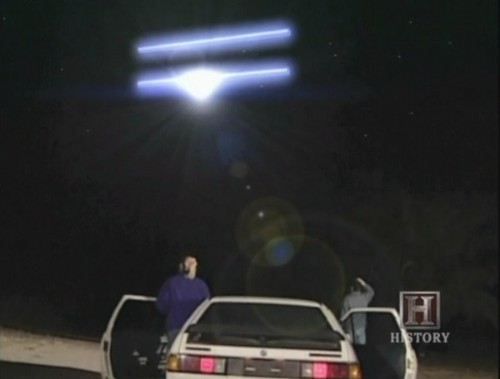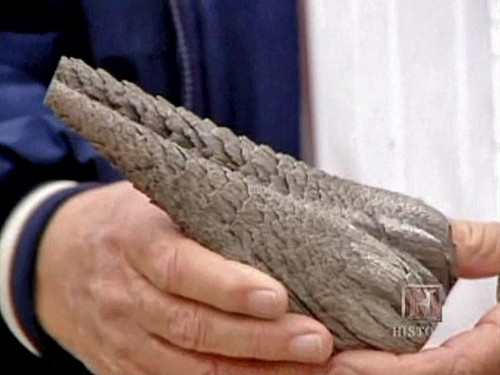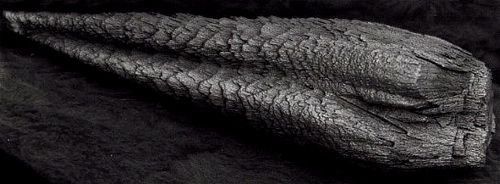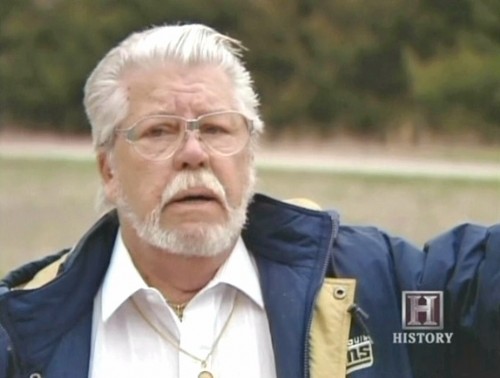Date:
1985
Location: Near Grand Junction, Colorado, United States
White
and a friend were driving from Denver to Las Vegas, when
they witnessed an object that was about 100 yards in front
of him, he said, "and it was huge ... absolutely
huge." As the craft flew away, White said, he noticed
an orange light falling to the ground. He recovered the
object, which is about 7-1/2 inches long and shaped like
a teardrop.

Artist's reconstruction of the encounter by Bob White
and his friend. (History Channel)

Bob White holds the "alien" artifact he recovered
in 1985. (History Channel)

Another photograph of the artifact.

Bob White discussing the "alien" artifact. (History
Channel)
Source:
Knight Ridder Newspapers, June 22, 2004
'Man
finds tough sell for his "UFO discovery"'
06/22/04
By
Steve Rock
Knight Ridder Newspapers
REEDS
SPRING, Mo. — Bob White is convinced his story deserves
a grand stage, that his most prized possession should
be displayed before a national audience.
It
should draw tourists from all over the country, he figures,
and be a major attraction for people who want to see an
artifact that White swears was retrieved from a UFO in
1985.
Instead,
White's find is in tiny Reeds Spring in southwestern Missouri,
secured in a locked display case at Museum of the Unexplained,
a converted video-rental store that, during a recent morning,
went more than three hours without a customer.
White
can't figure it out.
All
he wants to do is find some believers. He wants people
to quit snickering and looking at him as if he's crazy.
He wants them to listen to his story, to take a hard look
at his metallic artifact, to give him a chance.
"This,"
White said, "is the most difficult thing I've
ever done in my life."
The
odds are stacked against him. He and his partner at the
museum, Robert Gibbons, have been rejected and ridiculed.
White estimates he has spent more than $60,000 traveling
to conferences, starting the museum, having the artifact
tested and retested.
And
yet he forges on.
"I'm
73 years old," White said. "I don't have
much longer."
"What
I'd like to see before I'm gone is the national media
get their heads out of their ... " White paused,
choosing his words carefully, "out of the sand.
I'd like to see the national media and everybody else
realize that what I have is real."
Scientists
theorize that the "UFO" lights that White
said he encountered could have been nothing more than
a meteorite, that his artifact could be space debris.
Some scientists who have tested the object said there
was nothing extraterrestrial about it.
Ask
White whether he believed in unidentified flying objects
prior to 1985, and he scrunches up his nose.
"Never,"
he said. "Not a bit. I was the biggest skeptic
in the world."
That
all changed overnight. Here's how he remembers it:
White
and a friend were driving from Denver to Las Vegas on
a desolate highway near the Colorado-Utah border. It was
2 or 3 a.m., he said, and White was sleeping in the passenger
seat. At one point, his friend woke him up and pointed
out a strange light in the distance. White didn't think
much of it and went back to sleep.
Then
his friend woke him up again. This time, White said, the
lights were blinding.
He
got out of the car and stared, dumbfounded. The object
was about 100 yards in front of him, he said, "and
it was huge ... absolutely huge."
In
time, he said, the lights bolted toward the sky and connected
with a pair of neon, tubular lights — "the
mother ship," White guesses now. And just like
that, he said, the entire contraption zipped eastward
through the Colorado sky and disappeared.
"What
I saw," White said, "was not of this
Earth."
As
the craft flew away, White said, he noticed an orange
light falling to the ground. A locator probe? Something
that simply broke off? It was red hot when he reached
it, he said, but in time, it cooled enough to pick up.
White shoved the object into the trunk of the car.
The
object is about 7½ inches long and shaped like
a teardrop. It has a coarse, metallic exterior and weighs
less than 2 pounds. It looks a bit like it could be a
petrified pine cone and is composed primarily of aluminum.
White
has had the item tested several times, hoping for some
answers.
The
Nevada-based National Institute for Discovery Science
in 1996 sent a sample of the object to the New Mexico
Institute of Mining and Technology.
"The
metallurgical analysis was pretty mundane," said
Colm Kelleher, a scientist at the National Institute for
Discovery Science.
"We
didn't find any evidence that it was extraterrestrial.
Now you can make the argument that we didn't spend $1
million and look at every conceivable option. We didn't
cover every base."
Another
scientist who tested it at a California laboratory —
and who asked that his name and that of the laboratory
not be used — said, "It didn't show any extraterrestrial
signature."
Sgt.
Gary Carpenter, who works at the North American Aerospace
Defense Command in Colorado Springs, Colo., said it was
not uncommon for NORAD to get calls about strange lights
and unidentified objects. Not once, he said, has the object
been identified as an alien spacecraft.
"Usually,
it turns out to be space debris from a satellite that's
decaying, or it's in the realm of naturally occurring
celestial lights," he said. "It could
be something like a falling star. It could be contrails,
the things you would see trailing an aircraft."
White
opened the Museum of the Unexplained with visions of turning
it into a destination. He wasn't looking to get rich —
according to the Missouri secretary of state's office,
the museum was registered as a non-profit organization
in August 2000 — but he hoped to spread the word
about his experience.
The
museum, about 13 miles north of the glitzy Branson strip,
might as well be in another world. There are no neon signs
pointing the way, no twinkling lights outside the front
door. Rather, it's sandwiched between the Humane Society
thrift shop and the Sunrise Cafe on Main Street.
It
has struggled, unable to tap into the Branson spinoff
crowd and secure a niche audience of its own. Only 2,800
people went through the doors that first year, when admission
was free, and the museum hasn't been able to replicate
those numbers since.
These
days, patrons age 12 and older pay $5 to stroll through
about 2,000 square feet of space. Exhibits include a keyboard
from the movie "Men in Black II" in which
the shift key doesn't capitalize or decapitalize but translates
from English to an alien language. Other exhibits are
little more than newspaper articles or passages from the
Internet affixed to the wall with thumb tacks.
The
focal point is White's artifact, and he takes no chances
with its safety. Motion detectors, closed-circuit TV and
window and door alarms protect it at all times. White
packs it up in a gun case every day at 5 p.m., and the
object never spends the night at the same place two nights
in a row. You can never be too sure, he figures, even
in a town with just 465 residents.
"I'm
happy for them that they're having a good time, but I
guess I'm just not into that kind of thing,"
said Kacee Cashman, the Reeds Spring city clerk since
1998. "I really think they've been accepted, but
everybody's kind of taking it with a grain of salt."
Said
White, "I don't know what I have to do to prove
this is the truth. You can't make this stuff up."
Source:
http://www.ufoevidence.org/cases/case365.htm
